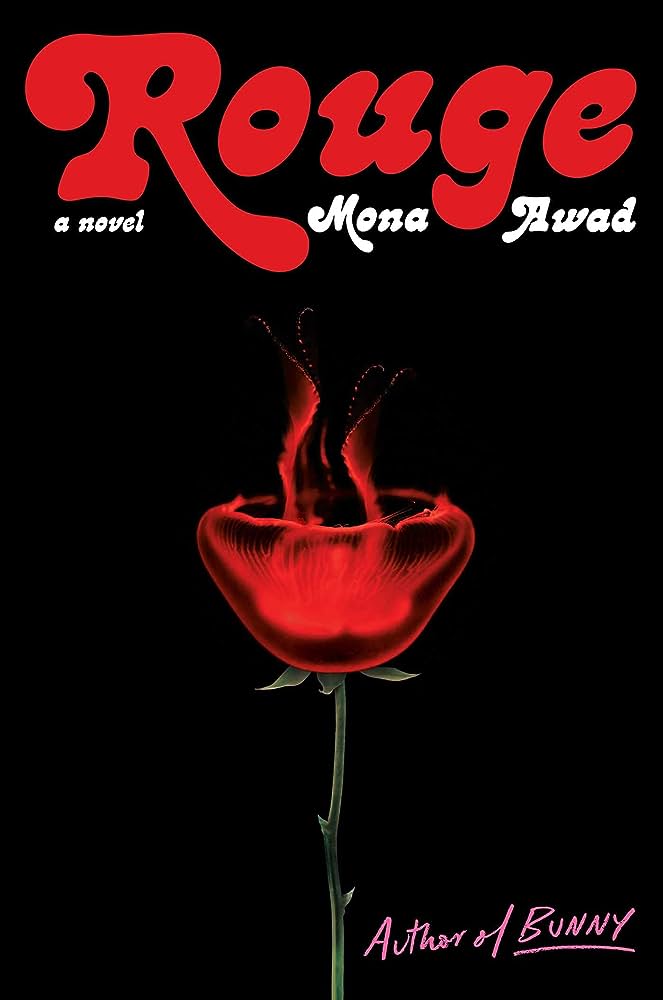On September 13th, in a cozy event hosted by Drawn and Quarterly, renowned author Mona Awad celebrated the release of her latest novel, Rouge. The Montreal-born writer’s fourth book might also be the one that hits the closest to home: the city features heavily in the childhood flashbacks of its central character, Mirabelle. Awad read an excerpt before discussing the book with fellow author Heather O’Neill and taking questions from the audience. Fans packed the room, sitting on the floor, gathering on couches, and spilling into the entryway. While there were readers of all ages present, it was clear that young women made up the majority of the room, an audience Awad has captivated thanks to her relatable explorations of female friendships and the complexity of womanhood. Rouge leans into these themes more than ever as Mirabelle navigates life after her mother’s death and what that means for their difficult relationship.

Featuring “enchanted” mirrors, an “evil snow queen,” and a skincare-obsessed main character whose complexion literally becomes whiter and “fairer” over the course of mysterious spa treatments, Rouge is clearly a Snow White pastiche. As Mirabelle grapples with the complexes she developed in childhood around race, femininity, and beauty, Awad problematizes the cultural connection between fairness as whiteness and fairness as beauty. The author explains:
“She lives in a fairytale world. And it’s a very western fairytale world, where beauty is equated with whiteness, or at least it certainly was for her. And I just think that’s so important in a book where somebody’s literally obsessed with their skin… how race might figure into that obsession.”
She also discussed how utilizing the structure of fairytales can be creatively freeing and how these stories give power to the powerless.
“They’re all about feeling powerless and then, you know, through a story, finding your way through. Even when they’re fantastic, even when there’s a fantasy involved or a wish fulfillment, that wish is laying there, in the reality of that powerlessness, in a really raw way I think. And so I love that—I love stories that use the surreal to reveal us in very real ways.”
Awad and host Heather O’Neill then had a lengthy conversation about how beauty culture, specifically online beauty tutorials, inspired Mirabelle’s obsessive daily skincare habits.
“This person with flawless skin is telling you, in a really hypnotic voice, to take care of yourself, you know? And their skin is literally glowing, well it does a lot of things to you. I was enchanted, but other feelings come up too. […] You can argue that obsession, mirror reflections are a kind of vanity. I don’t know that it is. I think it’s just a recognition of your existence―maybe even a recognition at the very same time of your mortality. And then an anxiety, that you will one day not be there.”
Lit in red and wearing red strappy heels of her own―just like the magic shoes of Mirabelle’s mother, Noelle―Mona Awad looked the part of the main character whose childhood was creatively influenced by her own. The author had a calm and settled presence that commanded the room, and confidence despite her timid demeanour. That confidence is to be expected of someone who writes from such honest experiences: her previous novels Bunny and All’s Well are inspired by her time in a graduate English program and her own history of chronic illness, respectively. “To me fiction is more exciting―it’s like wearing a mask at a party…you can have more fun. And I also find that I can be more honest with that mask on, than when it’s off, you know? That’s when I really tell the truth.”
Rouge is on sale now. You can read our review here.
